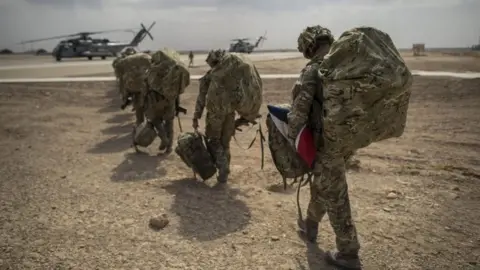UK military not defeated in Afghanistan, says head of British armed forces
 Ben Birchall/PA Wire
Ben Birchall/PA WireThe UK may be withdrawing most of its troops from Afghanistan but it was not defeated on the battlefield, the head of the British armed forces has said.
It comes after the mother of the youngest British soldier to die there questioned what had been achieved.
Chief of Defence Staff General Sir Nick Carter said attacks such as 9/11 had been prevented from "occurring from Afghanistan" in the period since.
He added "not a day goes by" without him thinking of the 457 UK lives lost.
Confirming most of Britain's troops had now left Afghanistan, Prime Minister Boris Johnson said there could "never be a perfect moment" to withdraw but the UK's presence there was "never intended to be permanent".
Lucy Aldridge, mother of William Aldridge, who was 18 when he was killed in 2009, told the BBC: "I'd like to see with my own eyes, what did we achieve? What was the sacrifice for? Because it's too high a price to pay."
Asked for his response to Ms Aldridge, Gen Carter told the Today programme he "absolutely" understood "where the bereaved come from".
"All those who fought in Afghanistan can hold their heads up very high," he said.
"The British military was not defeated on the battlefield. They showed remarkable adaptability against a very cunning and nefarious opponent, and they showed phenomenal courage under great pressure.
"And, at the end of the day, we have prevented attacks like the one we saw from al-Qaeda on 9/11 ever occurring from Afghanistan in this intervening period, and I think there's no reason to suppose that that can't prevail."
At the height of the war, Nato had more than 130,000 troops from 50 nations in Afghanistan. The UK had 9,500 personnel and 137 bases in Helmand province alone.
But with both the US and UK withdrawing their troops from Afghanistan, violence has been rising and the Taliban are thought to now control more than a third of the country's 400 districts.
On Friday, Afghan officials said the Taliban had captured a major border crossing between Afghanistan and Iran.
Gen Carter said the Afghan army had made a strategic decision to withdraw from some rural parts of the country and concentrate forces on key urban areas.
Asked if he thought the almost two decades spent there had been a success or a failure, Gen Carter said it was "too early to judge" - and he saw three possible scenarios that could play out.
"I think, first and foremost, the current Afghan government, with its very well-trained army, could hold the ring, as it's demonstrating through holding all of the provincial capitals at the moment," he said.
"The second scenario - a very sad scenario - is where the country fractures and you see that government collapse, the Taliban perhaps controlling part of the country and the other nationalities and ethnicities controlling other parts of the country, like we saw in the 1990s.
"Then I think there is a third, more hopeful scenario, which is where you actually see a political compromise and talks occurring.
"If the current Afghan government holds on for long enough and proves to the Taliban it can't be defeated, then I think the third scenario becomes ever more likely."
Asked if the US and UK were abandoning their responsibilities by leaving, the general said both nations would maintain a "diplomatic presence in Kabul for the foreseeable future".
He added the current Afghan army was the best the country had ever had, and that Afghan government institutions, including the army, would continue to receive support in the form of international funding.

